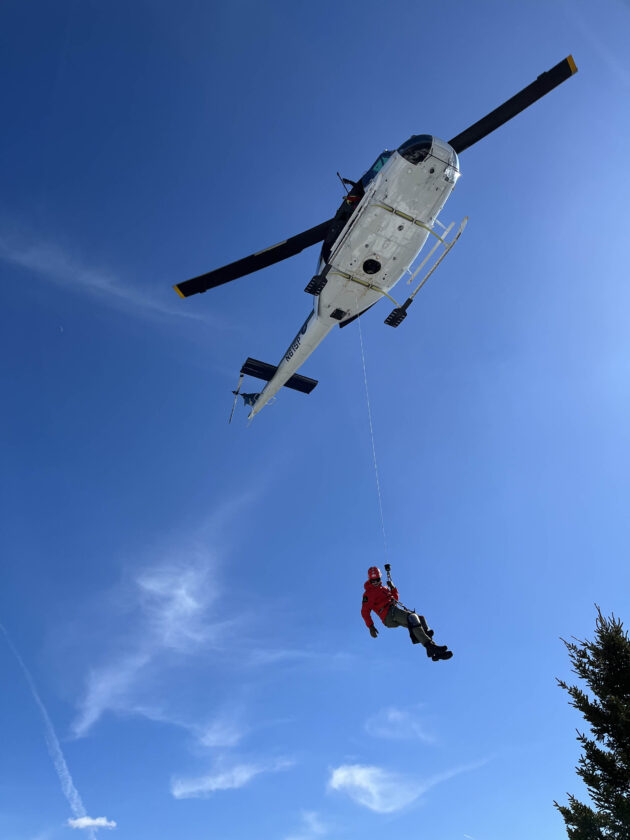
Ranger Joseph Ordway hangs from a helicopter during a rescue on Catamount Mountain.
(Photo provided — NYSDEC)
LAKE PLACID — As the total solar eclipse on April 8 fast approaches forest rangers with the state Department of Environmental Conservation are preparing for a potential spike in backcountry traffic and emergency response.
“We’ll have rangers ready to respond on a moment’s notice,” Region 5 North Forest Ranger Captain Kevin Burns said Wednesday.
Burns’ region Clinton, Franklin, Hamilton and part of Essex counties.
Rangers deal with everything from backcountry and water rescues to fighting and preventing forest fires and enforcing environmental law.
With state Homeland Security and Emergency Services Division estimating New York’s totality corridor will see 170,000 visitors, many of whom are slated to flood the Tri-Lakes for the eclipse weekend, there is potential for all kinds of emergencies, be it vehicle crashes, medical emergencies or backcountry rescues.
Early April is mud season in the Adirondacks, a time when rangers normally advise hikers to avoid the backcountry due to difficult trail conditions and the potential to damage trails. The eclipse may bring challenges, Burns said, as more people enter the backcountry than there would be normally to view the event. Rangers are advocating that visitors stay out of the backcountry and instead watch the eclipse from one of the many designated viewing areas across the Tri-Lakes.
Though Burns has not dealt with something like this once-in-a-generation event, he said rangers can plan for it based on similar influxes of people, such as Columbus Day weekend, which is also the Canadian Thanksgiving. From past experiences, he knows that good weather will overwhelm the High Peaks with hikers, which rangers plan for accordingly. Having that plan is crucial, he said.
To prepare, Burns said rangers are working hard to educate the public before they hit the trail. Since rangers cannot stop people from entering state land, this is their best option to proactively keep the public safe, he said. Part of this education is making sure hikers know what they’re getting into.
This is done through public notices and hiking guidance, all available on the Department of Environmental Conservation’s website. It’s also done by “Preventative Search and Rescue,” or PSAR. Rangers will be posted at as many of the most popular High Peaks trailheads as possible, such as the Adirondack Loj and trailheads on the state Route 73 corridor, to educate the public before they enter the backcountry.
Spring conditions in the Adirondacks are some of the most challenging. At low elevations, spring melt will leave trails muddy with patches of ice throughout, making trails difficult to navigate. This causes many hikers to veer around mud and ice, eroding and widening trails.
At higher elevations, hikers will encounter snow pack, which can range from 6 inches to 4 feet in April, depending on the winter. Even with the current mild winter, Burns said the snow pack this April could still be 3 or 4 feet deep. Hikers will also encounter rotting snow, which makes post-holing — breaking through the surface of the snow — more likely without snowshoes. Post-holing can make hiking much harder and can cause serious leg injuries.
“If you’re not prepared for it, it could be extremely difficult,” Burns said.
Exposed summits will probably be bare of snow, but sheet ice is likely. This ice makes the trail nearly impossible without the right equipment, such as micro-spikes, Burns said.
“There’s a strong possibility they’ll need snowshoes with them, and or micro-spikes, for safe travel,” he said.
Burns also said that ski or trekking poles are crucial, as well as proper clothing. Proper clothing does not just mean what hikers wear, but the extra layers they bring in the event of injury or getting lost, which may mean waiting hours in one spot for rescue.
While proper gear is essential for backcountry travel, Burns said the most important thing for individuals to consider is their experience. It’s vital that hikers honestly acknowledge their own abilities and that of their group when choosing a hike. This is the best way to avoid emergencies, Burns said.
All 26 Region 5 North rangers will be working on April 8, with rangers from Region 5 South’s roster of 28 likely coming as backup, Burns said. There will be a number of staging areas across the North Country where rangers will be on standby all weekend and during the event period to ensure fast and efficient responses to calls. Staging will continue after totality, as Burns said he anticipates responding to emergencies as people come down off summits. Members of volunteer Search and Rescue of the Northern Adirondacks will be “on speed-dial” in case ranger resources are overwhelmed.
Rangers have also been working closely with State Police and other local agencies. Talks began nearly two years ago, Burns said; there are now weekly meetings as the eclipse draws near. Part of the eclipse plan is an Incident Action Plan, which ensures that State Police know where all the ranger staging areas are and have the appropriate contacts in case they’re needed for rescue backup or traffic control. Every agency is aware of what the others are doing, Burns said.
Burns’ best-case scenario is a day of amazing weather, with all backcountry users taking to the trail with a full understanding of the challenging conditions, how to be prepared and having a backup plan. The most concerning thing for rangers is people entering the backcountry unprepared and without experience, he said.
He added that it is crucial to “do your homework” beforehand. The DEC’s eclipse Public Safety Information and Viewing Guidance press release can be found here: dec.ny.gov/news/press-releases/2024/3/dec-issues-public-safety-information-and-viewing-guidance-ahead-of-2024-solar-eclipse.
For information on hiking preparedness, go to: dec.ny.gov/things-to-do/hiking/hike-smart-ny.
For information on hiking in spring conditions, go to: dec.ny.gov/news/press-releases/2024/3/dec-issues-spring-conditions-advisory-for-adirondacks.
To contact a Region 5 ranger, call the ranger dispatch at 1-833-NYS-RANGERS (1-833-697-7264) and follow the menu guidance.
“We really want everybody to come away with an amazing experience … but at the same time we want everyone to be safe,” he said.




